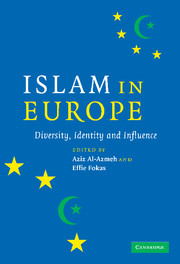Book contents
- Frontmatter
- Contents
- List of figures
- List of contributors
- List of abbreviations
- Preface
- 1 Introduction
- 2 Christians and Muslims: memory, amity and enmities
- 3 The question of Euro-Islam: restriction or opportunity?
- 4 Muslim identities in Europe: the snare of exceptionalism
- 5 From exile to diaspora: the development of transnational Islam in Europe
- 6 Bosnian Islam as ‘European Islam’: limits and shifts of a concept
- 7 Islam in the European Commission's system of regulation of religion
- 8 Development, discrimination and reverse discrimination: effects of EU integration and regional change on the Muslims of Southeast Europe
- 9 Breaching the infernal cycle? Turkey, the European Union and religion
- 10 Afterword
- Index
- References
5 - From exile to diaspora: the development of transnational Islam in Europe
Published online by Cambridge University Press: 05 June 2012
- Frontmatter
- Contents
- List of figures
- List of contributors
- List of abbreviations
- Preface
- 1 Introduction
- 2 Christians and Muslims: memory, amity and enmities
- 3 The question of Euro-Islam: restriction or opportunity?
- 4 Muslim identities in Europe: the snare of exceptionalism
- 5 From exile to diaspora: the development of transnational Islam in Europe
- 6 Bosnian Islam as ‘European Islam’: limits and shifts of a concept
- 7 Islam in the European Commission's system of regulation of religion
- 8 Development, discrimination and reverse discrimination: effects of EU integration and regional change on the Muslims of Southeast Europe
- 9 Breaching the infernal cycle? Turkey, the European Union and religion
- 10 Afterword
- Index
- References
Summary
Islam in Europe faces the challenge of defining a role for Islam outside the classic Islamic countries, the dar al Islam. This means resituating Islam in three respects: with reference to the country of immigration, to the country of origin, and to global Islam. Situating Islam in the immigration society and in Europe in particular, is complicated by two distinctive features. On the one hand, there is a long tradition (nurtured again and again by both sides) of situating oneself in a structure of alterity, i.e. posing an antagonistic relationship between a purportedly ‘Islamic’ and a purportedly ‘Judeo-Christian’ value system. On the other hand, the layers of society supporting Islam are for the most part worker migrants and their descendants. They are newcomers to Europe who assumed their position at the bottom of the professional ladder and slowly worked their way up over generations. Thus, Islam is not only the other religion per se, it was also often the religion of the worker, of the underclass, the outsider, and the ghetto-dweller. These two aspects distinguish the situation of Islam in Europe from its situation in other regions where Islam is in the minority.
Secondly, one must establish a reference to the country of origin. The country of origin, and the role religion plays in it, are viewed from the outside and are projected onto the screen of differences to the society of immigration.
- Type
- Chapter
- Information
- Islam in EuropeDiversity, Identity and Influence, pp. 68 - 95Publisher: Cambridge University PressPrint publication year: 2007
References
- 12
- Cited by



